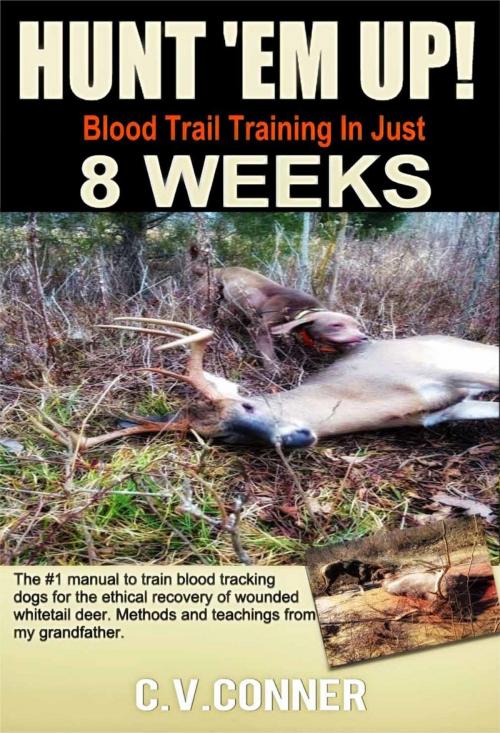Hunt 'em Up! Train Your Dog To Blood Trail in 8 Weeks
Hunter's Edge, #1
Nonfiction, Sports, Field Sports, Individual Sports, Archery, Outdoors, Hunting| Author: | C.V.Conner, Ph.D. | ISBN: | 9781387343935 |
| Publisher: | Belo / The Conner Company | Publication: | November 16, 2017 |
| Imprint: | Language: | English |
| Author: | C.V.Conner, Ph.D. |
| ISBN: | 9781387343935 |
| Publisher: | Belo / The Conner Company |
| Publication: | November 16, 2017 |
| Imprint: | |
| Language: | English |
What we’re trying to do with this book is help the hunter to have another option, that option is to call in someone nearby with a trained blood tracking dog, YOU. These dogs can find deer that human hunters might walk right by. They are able to scent trail deer, even when there is no blood at all to follow. A trained tracking dog can lead its handler to a deer even several days after it was shot. And that is what this book is all about, getting you started on training a dog that can cut your deer tracking time in half and increase your recovery rate by 80 or 90 percent.
Basically, training almost any dog to blood trail is simple. It’s so simple in fact that I can sum it up in just a few paragraphs. You don’t have to own a hound to train your own tracking dog. Any breed with the nose to follow a trail can be trained. I have seen everything from labs to Jack Russell terriers to dachshunds trained to trail deer. I personally have a black lab named “Tilly”, and a heeler/shepherd mix named “Diamond Cut”. In short, you would start out your training by making a game of it. You could use a strip of bacon or a piece of calf liver tied to a string as your first scent marker. To make sure the dog is following the calf liver or bacon scent and not yours tie the string to the end of a long pole to drag it well away from your own scent trail.
As your dog become more adept at following the trail, you should start to make it more difficult by hopping the calf liver or bacon strip along the ground and lifting it for several feet between touches.
Getting your dog fully trained to blood trail takes a lot of time and patience. But knowing how to get the dog motivated to track and stay with the right line from the beginning really pays off when working with hunters to recover their harvest. The best teacher is time spent with the dog and a lot of it! Time spent in the field tracking through the season and training the rest of the year. This is what it takes to form a bond. And that bond is strengthen and reinforced in life's journey with your blood trail dog! If I gave you no more information than what’s above you would have enough to get your dog started with blood trailing. But in reality, there is a lot more to be learned about tracking with a dog. So let’s get started now to build a complete training course for your new blood trailing student.
What we’re trying to do with this book is help the hunter to have another option, that option is to call in someone nearby with a trained blood tracking dog, YOU. These dogs can find deer that human hunters might walk right by. They are able to scent trail deer, even when there is no blood at all to follow. A trained tracking dog can lead its handler to a deer even several days after it was shot. And that is what this book is all about, getting you started on training a dog that can cut your deer tracking time in half and increase your recovery rate by 80 or 90 percent.
Basically, training almost any dog to blood trail is simple. It’s so simple in fact that I can sum it up in just a few paragraphs. You don’t have to own a hound to train your own tracking dog. Any breed with the nose to follow a trail can be trained. I have seen everything from labs to Jack Russell terriers to dachshunds trained to trail deer. I personally have a black lab named “Tilly”, and a heeler/shepherd mix named “Diamond Cut”. In short, you would start out your training by making a game of it. You could use a strip of bacon or a piece of calf liver tied to a string as your first scent marker. To make sure the dog is following the calf liver or bacon scent and not yours tie the string to the end of a long pole to drag it well away from your own scent trail.
As your dog become more adept at following the trail, you should start to make it more difficult by hopping the calf liver or bacon strip along the ground and lifting it for several feet between touches.
Getting your dog fully trained to blood trail takes a lot of time and patience. But knowing how to get the dog motivated to track and stay with the right line from the beginning really pays off when working with hunters to recover their harvest. The best teacher is time spent with the dog and a lot of it! Time spent in the field tracking through the season and training the rest of the year. This is what it takes to form a bond. And that bond is strengthen and reinforced in life's journey with your blood trail dog! If I gave you no more information than what’s above you would have enough to get your dog started with blood trailing. But in reality, there is a lot more to be learned about tracking with a dog. So let’s get started now to build a complete training course for your new blood trailing student.















